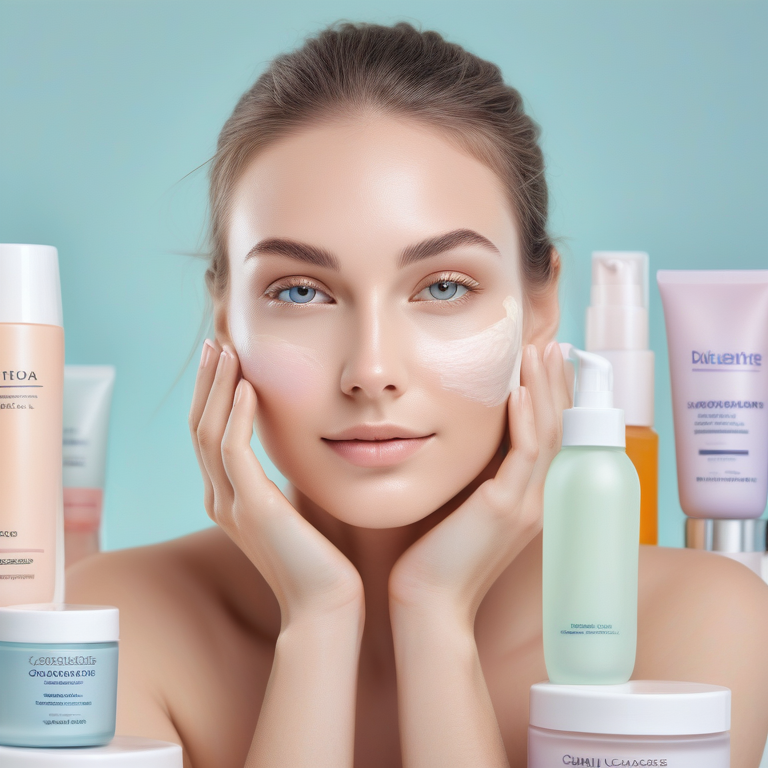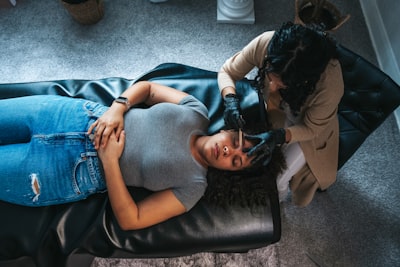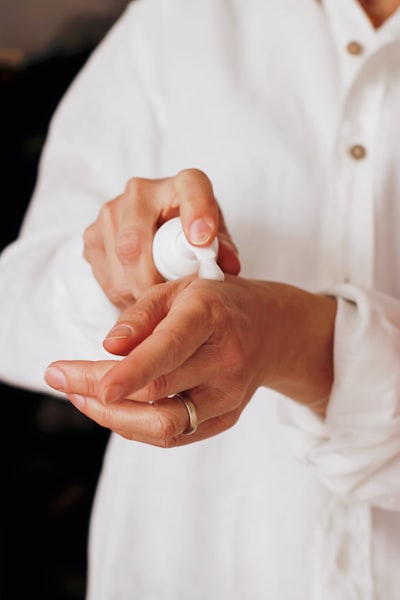Dermatologist-Approved Tips for Clear Skin

Key Highlights
- Understanding your skin type is crucial for creating an effective skin care routine that caters to your specific needs.
- Daily skin care, including cleansing, moisturizing, and wearing sunscreen, is fundamental for maintaining skin health.
- Managing acne involves choosing the right products, adopting healthy habits, and considering professional treatments.
- Addressing dry skin requires intense hydration with the right moisturizers and lifestyle adjustments.
- Oily skin necessitates proper cleansing, oil control measures, and a balanced skin care approach.
Introduction

Getting clear skin is a goal many people share. It takes a personal touch, but there are some tips from dermatologists that can help you. Good skin care practices are very important. They help keep your skin healthy and can stop problems from happening, giving you that nice glow. This guide looks at advice and tips from experts on how to get and keep clear skin.
Understanding Your Skin Type
Before starting a skin care routine, it’s important to know your skin type. This helps you choose the right products and methods for your skin’s needs. If you misidentify your skin type, the results could be unhelpful or even harmful.
Understanding your skin type also helps you see how your skin may respond to various products and outside conditions.
The Importance of Knowing Your Skin Type

Each skin type has its own traits that affect how it reacts to different skin care methods. Adjusting your skin care routine to fit your skin type helps you pick products and ingredients that work well with your skin’s needs.
For example, people with oily skin may find it helpful to use oil-free, mattifying products. On the other hand, those with dry skin may need richer, more hydrating options.
Understanding the needs of your skin type lets you make smart choices about your skin care routine. This way, you can get the best results and support healthy skin health over time.
How to Determine Your Skin Type at Home
Determining your skin type at home is easy. First, wash your face using a gentle cleanser and dry it by patting. Watch how your skin changes during the day and check some areas:
- Oily Skin: Your skin looks shiny all day, especially in the T-zone.
- Dry Skin: Your skin feels tight and may have some flakes that you can see.
- Combination Skin: Your T-zone is often oily, while places like your cheeks feel dry.
By noticing these signs, you can understand your skin type better and adjust your skin care routine based on that.
Essential Daily Skin Care Routine

Having a regular daily skin care routine is very important for keeping your skin healthy and having clear skin. A simple routine usually includes washing your face, putting on moisturizer, and protecting your skin from the sun.
By sticking to a good routine, you can greatly improve your skin’s health and look.
Morning Skin Care Rituals for Radiant Skin
Begin your morning skin care routine by washing your face with a gentle cleanser.This will help remove dirt and oil that built up overnight. Next, use a vitamin C serum. This strong antioxidant helps protect your skin from harmful things in the environment and gives you a brighter look.
Then, put on a moisturizer that matches your skin type. This will add hydration and help keep your skin strong.
Lastly, apply a broad-spectrum sunscreen with at least SPF 30. This protects your skin from the sun’s harmful UV rays, even on cloudy days.
Nighttime Skin Care Steps for Repair and Regeneration

As the day ends, move into your nighttime skin care routine. This routine should focus on repair and regeneration. Start by completely removing your makeup and cleansing your face. This will give you a clean canvas for better product absorption.
Next, apply a nourishing night cream. This will give your skin the nutrients and moisture it needs while you sleep. During beauty sleep, your body naturally repairs itself, so use this time for your nighttime routine.
Having a dedicated routine at night, along with a good night’s sleep, will help you have healthier and brighter skin.
Tips for Managing Acne-Prone Skin
Acne is a common skin issue that needs different ways to be managed well. Breakouts happen to many people, but knowing what causes acne can help you take steps to prevent it and find the right treatments.
By selecting the right products and making healthy lifestyle changes, you can make a plan that helps you achieve clearer skin.
Choosing the Right Acne Treatment Products
Choosing the right acne treatment products is very important for dealing with breakouts. Ingredients like benzoyl peroxide and salicylic acid are common in acne treatments. They help fight bacteria and clear blocked pores.
Benzoyl peroxide works well to target the bacteria that cause acne. On the other hand, salicylic acid helps to remove dead skin cells and keep pores open.
Seeing a dermatologist can guide you on which ingredients are best for your acne type and skin sensitivity.
Lifestyle Changes to Combat Acne
Beyond creams and treatments, changes in your lifestyle can really help with acne. Eating a balanced diet full of fruits, vegetables, and whole grains can improve your skin health.
Also, managing stress by exercising, meditating, or enjoying nature can balance hormones that might cause breakouts. Keep in mind that good skincare looks at both outside and inside of your body.
By focusing on these things, you build a strong base for healthy skin.
Strategies for Dry Skin Hydration
Dry skin happens when your skin lacks moisture. This often leads to flakiness and tightness. To help dry skin, you need a plan to keep it hydrated. This means not just adding moisture but also building up the skin’s barrier. A strong barrier stops more moisture from getting lost.
Choose rich moisturizers that give a lot of hydration. It is also important to make lifestyle changes that support healthy skin. Focusing on moisture is essential for bringing back balance and comfort.
Best Moisturizers for Keeping Dry Skin Hydrated
Choosing the right moisturizers is very important if you want to treat dry skin. Look for ingredients like hyaluronic acid. This ingredient pulls in moisture and keeps it in your skin. You should also consider ceramides. They help to strengthen the skin barrier and stop your skin from losing moisture.
Natural oils, like coconut oil, shea butter, or jojoba oil, give deep hydration and help calm dryness. Think about what your skin needs when you choose a product.
Trying out different options can help you find the best moisturizer to satisfy your dry skin’s needs.
Humidifiers and Hydration: Enhancing Skin Moisture from Within
While it is important to keep your skin hydrated on the outside, adding moisture from the inside is also very important to fight dryness. Using humidifiers is a great idea, especially in dry places or in winter. They can put moisture in the air and stop your skin from losing too much water.
Also, drinking enough water during the day helps your skin cells work well and keeps your skin healthy. These ways of adding moisture inside your body will work well with a good routine for your skin. Together, they can fight dryness and help keep your skin’s moisture just right.
Taking care of both outside and inside factors makes sure your skin gets the moisture it needs to stay healthy.
Solutions for Oily Skin Management
Oily skin happens when the skin makes too much oil. To manage it, you need a balanced approach. You may think that drying your skin out will help, but doing so can make the problem worse. This is because stripping away natural oils can cause your skin to produce even more oil.
The important part is to control oil production and keep your skin hydrated. You should also follow good skin care practices that help keep your complexion balanced.
Effective Cleansers for Oily Skin
Choosing the right cleansers is important for taking care of oily skin. Look for cleansers that are made for oily skin types. You can also pick ones that say “oil-free” or “non-comedogenic.” These help prevent clogged pores.
Ingredients like salicylic acid or tea tree oil are good. They can break down excess sebum and keep breakouts away. They do this without drying out your skin too much. Try different cleansers to find a gentle cleanser that gets rid of excess oil and dirt but keeps your skin moist.
A good cleanser is the first step for a successful oily skin care routine.
Matte Products and Their Role in Controlling Shine
Incorporating matte products in your makeup routine can help reduce shine. This will give you a smoother look during the day. Choose oil-free foundations, powders, and blotting papers. They absorb excess oil without messing up your makeup.
Also, make sure to clean your makeup brushes often. This helps stop bacteria and oils from getting on your skin.
By following these tips, you can manage oil better and keep a fresh look all day long.
Combating Signs of Aging
As we get older, our skin goes through changes. We may see fine lines, wrinkles, and age spots. These changes happen naturally. Still, there are ways to reduce their look and keep our skin glowing.
We can protect our skin from things that harm it. Using anti-aging products can help too. Living a healthy life is also important to fight the signs of aging.
Anti-Aging Products That Dermatologists Swear By
Dermatologists often suggest using anti-aging products that target specific skin concerns as we get older. Retinoids, which come from vitamin A, are very good at helping skin cells turn over. They can make skin texture better and lessen the look of fine lines and wrinkles.
Serums that are high in antioxidants, with ingredients like vitamin C and vitamin E, help protect the skin from damage. This damage can happen from sun exposure and other environmental factors.
Using these powerful ingredients in a regular skin care routine can help keep your skin looking youthful.
The Role of Sunscreen in Preventing Premature Aging
One important way to stop getting older too soon is to protect your skin from the sun’s harmful UV rays. Sunscreen works like a shield. It absorbs or reflects UV light, which helps reduce damage that can cause wrinkles, sunspots, and other signs of aging.
Look for a broad-spectrum sunscreen with an SPF of 30 or more. Apply it generously on all exposed skin every day, even when it’s cloudy. Make it a habit to wear sunscreen just like you would with any other part of your skin care routine.
Using sun protection often is key to keeping your skin looking young and healthy.
The Impact of Diet on Skin Health
The saying “you are what you eat” is true for skin health. What we eat affects our overall health and the look of our skin.
A balanced diet gives our skin the nutrients it needs to stay healthy. However, some foods can make skin problems worse.
Foods to Eat for Glowing Skin
Nourishing your body with a diet full of goods for the skin is a tasty way to keep your skin healthy. Make sure to eat lots of fruits and vegetables high in antioxidants. Berries, spinach, and kale are great options. These strong compounds help guard against damage from free radicals, which can cause aging too early.
Include healthy fats like those from avocados, nuts, and fatty fish. These fats offer necessary fatty acids that keep your skin hydrated and support a healthy skin barrier. Also, don’t forget to get enough vitamin C. This strong antioxidant helps with collagen production and improves your skin’s brightness.
Eating a lively and various diet gives your skin the building blocks it needs for the best health.
Foods to Avoid for Clear Skin
Eating healthy foods helps your body. However, some foods may make skin problems worse. Foods that are high in sugar, like candy, soda, and white bread, can cause inflammation and lead to acne for some people.
Some also notice that dairy products, even skim milk, can trigger acne because of the hormones in milk. Watch how your skin reacts to different foods. If you see any links between your food and your skin health, think about changing your diet.
Everyone’s body is unique, so it is important to pay attention to what your body is telling you.
Importance of Hydration for Skin Health
Water is very important for life. Our skin is the biggest organ, so it needs a lot of water to work well. Drinking enough water helps our health. It helps our blood flow and helps get rid of toxins.
When we drink enough water, our skin cells stay full and hydrated. This makes our skin look bright and young.
How Much Water Should You Drink for Healthy Skin?
The amount of water you should drink each day for healthy skin can change based on things like how active you are, the weather, and your personal needs. A good target is about eight glasses of water a day. But it’s important to pay attention to when you feel thirsty.
When we drink enough water, our skin cells can do their important jobs better. These jobs include moving nutrients, keeping the right temperature, and getting rid of waste. Staying hydrated through proper water intake helps your skin stay healthy and look radiant.
Keep in mind that focusing on hydration is key to supporting overall skin health.
Signs Your Skin Needs More Hydration
Recognizing the signs of dehydration can help you act quickly to bring back moisture to your skin. One clear sign is dry skin. It tends to feel flaky, tight, and looks dull.
You may also see fine lines, especially around the eyes and mouth. These lines can look worse when your skin is dehydrated. Additionally, you might feel more sensitivity, itching, or see a rough skin texture.
If you notice these signs, it is important to drink more water. You should also check your skin care routine and choose products that add hydration. This will help restore moisture levels and give your skin a natural glow.
Advanced Skin Care Treatments
If you want to solve specific skin problems or improve your skin’s appearance, there are many advanced skin care treatments available. These treatments usually need professionals like dermatologists or licensed estheticians to do them.
Advanced options include chemical peels and laser therapies. These treatments can give you focused results and work well with your at-home skin care routine.
Chemical Peels and Their Benefits for Skin Clarity
Chemical peels are when a special solution is put on the skin. This causes the skin to flake off and eventually peel. By removing the top layers of skin, chemical peels can help with many problems like acne, dark spots, fine lines, and uneven skin texture.
This process helps get rid of dead skin cells and shows smoother and brighter skin underneath. There are different kinds of chemical peels for different needs. A dermatologist can help you find out which type is best for your skin type and problems.
Adding chemical peels to a good skin care routine can really improve your path to clear skin and a more even skin tone.
Laser Therapy for Skin Texture Improvement
Laser treatments have gained popularity for their effectiveness in addressing various skin concerns, including uneven skin texture, acne scars, and hyperpigmentation. These treatments utilize targeted beams of light to stimulate collagen production, improve skin tone, and reduce the appearance of imperfections.
Depending on the specific type of laser and the desired outcome, laser treatments can be customized to address individual concerns. It’s crucial to consult a qualified and experienced dermatologist or laser technician to determine the most suitable laser treatment for your unique needs.
| Laser Type | Target | Benefits |
| Ablative Lasers | Deeper layers of skin | Removal of wrinkles, scars, and sun damage |
| Non-Ablative Lasers | Superficial layers of skin | Stimulation of collagen production, improvement of fine lines, acne scars, and skin tone |
Navigating Sensitive Skin Challenges
People with sensitive skin face special problems while building a skin care routine. This skin type needs extra care and focus because it can react to different ingredients and outside factors.
To manage sensitive skin well, you need to find and avoid common triggers. It’s important to choose gentle products and keep the skin barrier healthy.
Identifying Triggers for Sensitive Skin
For people with sensitive skin, finding and avoiding triggers is very important. This helps to reduce irritation and keep skin healthy. Common triggers are fragrances, essential oils, strong sulfates, and some preservatives.
Keeping a skin care journal can help track which skin care products or ingredients may cause reactions. It is also smart to do patch testing with new products on a small area before using them on more skin. This way, you can prevent any bad reactions.
Knowing your skin’s specific sensitivities helps you choose skin care products that support balance and reduce irritation.
Gentle Skin Care Products for Sensitive Skin
Choosing the right skin care products is very important for people with sensitive skin types. Look for items made especially for sensitive skin. These are often marked as “hypoallergenic” or “fragrance-free.” Pick gentle cleansers that can clean away dirt without taking away your skin’s natural oils.
Stay away from products with strong exfoliants, alcohol, or astringents because they can irritate sensitive skin more.
It’s good to keep your skin care routine simple. Focus on gentle cleansing, keeping your skin hydrated, and protecting it. This way, you can better manage sensitive skin.
Conclusion
To get clear skin, it is important to know your skin type. You should follow a skincare routine that suits you. Doctors who study skin suggest finding out what triggers your sensitive skin. They also say to pick the right products for oily or acne-prone skin. Using treatments to prevent aging can help too. Keeping your skin hydrated, eating well, and trying treatments like chemical peels can make a big difference for your skin health. Remember, being consistent is very important for healthy skin. Focus on making changes to your lifestyle, using the right products, and seeking professional advice. If you do this, you can enjoy radiant and youthful skin. Start using these tips from skin experts today for a glowing complexion that shows confidence and energy.
Frequently Asked Questions
What Is the Best Way to Identify Your Skin Type?
The best way to find out your skin type is to watch how your skin acts after you clean it. If you have oily skin, it will usually look shiny during the day. For dry skin, it may feel tight. If you have combination skin, it will show traits of both. Change your skin care routine based on what you notice.
Can Dietary Changes Really Improve Skin Clarity?
Yes, diet is very important for skin health. Eating a balanced diet with lots of fruits, vegetables, and healthy fats helps. It is also good to stay away from foods that cause inflammation, like processed foods and sugary drinks. This can lead to clear skin in healthy ways.
How Often Should You Exfoliate Your Skin?
The number of times you should exfoliate your skin varies based on your skin type and how well your skin can handle it. Usually, exfoliating 1-2 times a week is enough for most skin types. This helps remove dead skin cells and keeps the skin barrier safe. Add this process to your skin care routine to show off healthy skin and help skin cells renew.
Are There Any Natural Remedies for Acne That Dermatologists Recommend?
Dermatologists often suggest using natural remedies, such as diluted tea tree oil. This oil has good antibacterial qualities, which can help with acne. It’s important to talk to a dermatologist before adding any new items to your skin care routine.
What Are the Most Effective Anti-Aging Skin Care Ingredients?
Effective anti-aging ingredients are retinoids, which help speed up cell renewal. Vitamin C is a strong antioxidant that brightens the skin. Hyaluronic acid works to hydrate and make the skin look fuller. It’s also important to remember that sun protection is very important to avoid early signs of aging.
https://www.aad.org/public/diseases/acne/skin-care
https://drwhitneybowebeauty.com
https://medlineplus.gov/druginfo/meds/a607072.html
https://www.dotdash.com/careers
https://www.schweigerderm.com/providers/rachel-nazarian-m-d/
